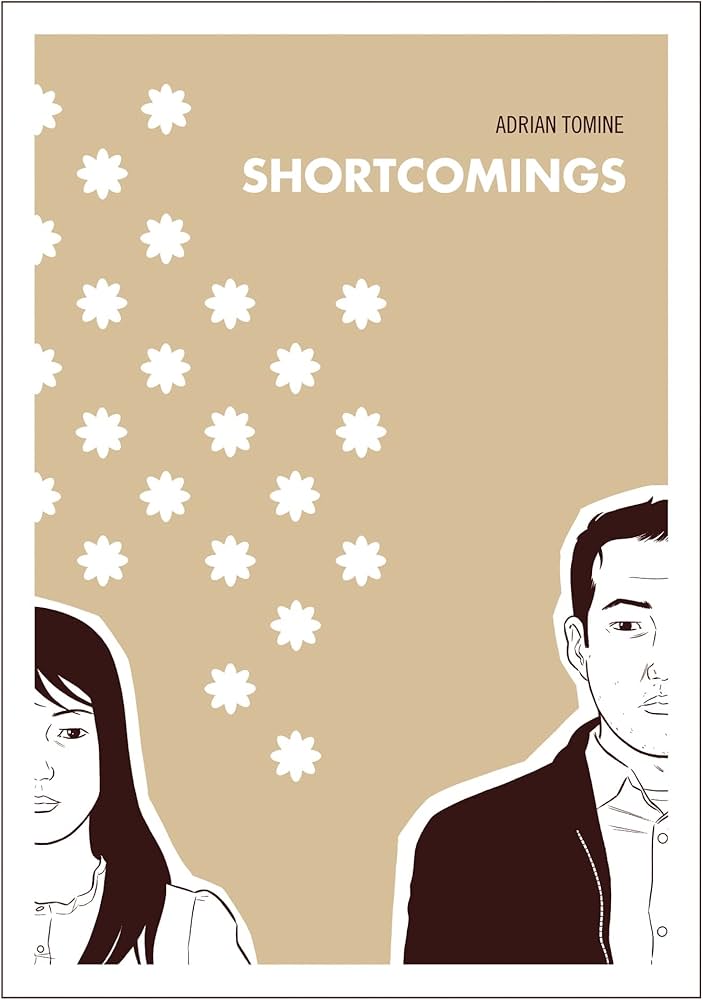Rating: 4/5, good
Shortcomings is a graphic novel about cranky 30-something Japanese-American man (Ben) whose relationship with an idealistic 30-something Japanese-American woman (Miko) is strained by his constant negativity and his undeniable interest in white women.
Set in Berkeley and later New York, it is very down-to-earth and realistic. If you know the San Francisco Bay Area, you’ll recognize the leftist political art that is gauche to critique, the experimental nude live shows, and the references to Mills College’s lesbian hookup culture.
Ben’s best friend Alice is a promiscuous lesbian that offers him moral support. She is a bit of a gay best friend stock character but her talks with Ben about their love lives are hilarious and give Ben some needed perspective.
There are a few twists and turns in the plot but things get resolved in a natural and expected way at the end.
Shortcomings has some interesting criticisms of Bay Area leftist culture, mainly that political art or art made to be shocking can be boring, obscene, empty, or all three of those things at once. It also shows some of the nuances of Asian American dating both inside and outside of the community.
There is a film adaptation of Shortcomings on Netflix starring Justin H. Min, who softens the character of Ben considerably. He’s still an asshole, of course, but you can’t be mad at him with such a sweet face. It doesn’t convey the bitterness of the original comic but the movie adaptation is going for a much lighter, more rom-com-like tone.
The graphic novel is a quick, easy read, and the movie is a lot of fun. It keeps most of the dialogue from the book, with a couple things changed here and there. It’s really interesting to watch it shortly after reading and compare them.
Spoilers past here:
The character of Leon is a lot more fleshed out and has some funny dialogue in the movie, where his scene is shorter in the book. Also, the movie that Ben doesn’t like and Miko doesn’t want to hear criticisms of at the beginning is a reference to Crazy Rich Asians. In the movie, Ben is the artsier one, where in the book he’s the one with more popular taste. When we were watching it, my partner pointed out to me that when Ben and Miko are fighting at the end the samurai sword is displayed with the handle to the right in an aggressive posture (handle to the right means you could easily grab it with your right hand, usually it’s displayed with the handle to the left).
Back to the book:
I felt like Ben didn’t have many positive qualities. He was very self-pitying and relied on the women around him to keep his negativity in check.
I think it’s good that he’s alone at the end. I think it will give him some time to learn to handle his own negativity and seek out what he loves instead of only reacting to the things the world presents him with that he hates.
It’s pretty clear that he was staying with Miko out of comfort and convenience rather than love, attraction, or common interests. It’s good that their relationship ended because they were both stuck and it was holding them back from finding someone who they actively wanted to be with. Now they are apart they can each find someone who shares not only their interest in film in general, but their specific interests in film.
It’s hard to say how important it is that partners share your particular interests… some people think it’s very important, others less so. In Ben and Miko’s case, I think their divergent interests were driving them apart because Ben thought Miko’s interests were stupid and he couldn’t hide his genuine reaction.
The narrative implies that you can’t control who you’re attracted to. Both Ben and Miko are attracted to white partners despite it being kind of politically incorrect within the Japanese-American community. The scene with Meredith (Alice’s girlfriend) in the bar points out that there’s a lot of sketchy pathologizing of minorities who seek to date white people and vice versa. It’s interesting to see how different types of interracial dating are talked about within the Asian-American community.
Ben says that an Asian man dating a white woman is good because Asian men are often portrayed as undesirable in American media while a white man dating an Asian woman is taking advantage of the physical and political power imbalance. There’s a double-standard in that which conveniently favors Ben’s interest in dating outside the community and stigmatizes Miko’s. And then of course Meredith’s parents are a white man and an Asian woman, which makes Ben’s going off about his opinions on it in her presence all the more awkward.
I like how the author handles this kind of hard-to-talk-about stuff without too much moralizing or too much ambiguity. The reader gets a good sense of how he thinks about these issues without him having to spell it out. There’s a lot of criticisms of this book saying that Ben is too unlikable a protagonist, but I think that Tomine is using the character of Ben to 1) voice unpopular opinions that he probably agrees with and 2) voice common opinions that he probably disagrees with and challenge those opinions by having other characters get offended. Unlikable protagonists can be very useful for exploring difficult social issues because they have that morally gray quality of not being a hero or a villain which allows the reader to more freely decide whether or not to agree with the protagonist.


Post a Comment